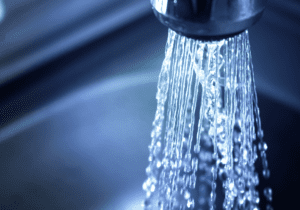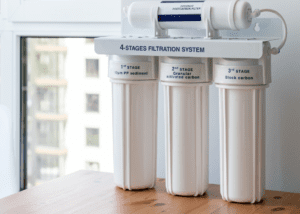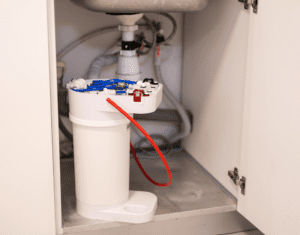
Home filters are essential for keeping your home's water supply clean and healthy. But how long do these filters last, and when should you replace them? In this blog post, we'll take a look at the factors that influence the lifespan of a home filter so you can make sure yours is functioning properly.
At Oak Plumbing, we have years of detailed experience with a wide variety of plumbing issues. We promise value for your dollar and offer special deals for all of your plumbing needs. Our skilled experts are certified in the following services:
- Water filtration services
- Sewer repairs
- Gas and Water Leak Detection
- Toilet, Slab Leak, Pipe, and Gas Line Repairs
- Kitchen & Bathroom Plumbing.
If you are experiencing any water filtering issues, our expert plumbers are trained in a variety of different methods to help resolve each individual case. Contact us to find your trusted professional plumber and special offers today.

Types of Home Water Filters
There are many types of home water filters available on the market today, each designed to remove different kinds of contaminants from your drinking water. Some of the most common types include activated carbon filters, reverse osmosis systems, ultraviolet light systems, and ceramic filters.
How Do Home Water Filters Work?
Home water filters work by using various methods to remove impurities from your tap water. Carbon filters use physical adsorption to attract molecules in your drinking water to its surface, where they are trapped and filtered out. Reverse-osmosis systems use pressure to force tap water through a semipermeable membrane that only allows pure H2O molecules through while trapping larger particles on one side of the membrane. Whole-house filtration systems work similarly but on a much larger scale, filtering out impurities before they enter your plumbing system and ultimately reach your taps or shower heads.
When To Change Your Home Filter
The general rule of thumb is that you should check your home filter every month and change it whenever it looks dirty or clogged with debris. However, the exact amount of time a filter will last depends on the type of filter you have as well as how often you use it. For example, if you live in an area with lots of dust or smoke, then your filter may need to be changed more often than someone who lives in a relatively cleaner environment.
Another factor that plays into how long your home filter will last is the size and type of filter you are using. Generally speaking, standard one-inch thick filters should be changed every three months, while thicker four-inch thick filters can last up to six months before needing replacement. If you want even better filtration, opt for a HEPA-rated filter which can last up to a year before needing replacement (depending on usage).
Finally, make sure you're changing your home filter regularly regardless of its type or thickness. Otherwise, not only will air quality suffer but also the lifespan of your HVAC system may decrease due to clogged filters reducing its efficiency.

Filter Types and Their Lifespans
Different filters have different lifespans depending on their size and capacity:
- Pleated Filters: A pleated filter is made from polyester fibers that are folded over multiple times, creating an accordion-like structure. These are some of the most common types of filters used in homes because they can trap particles as small as one micron in size, making them great for removing dust, pollen, and other airborne particles from your air. Pleated filters should be replaced every 1-3 months, depending on usage.
- HEPA Filters: HEPA stands for High-Efficiency Particulate Air, and these filters are designed to remove microscopic particles such as smoke, bacteria, and allergens from the air. They use extremely fine meshes that can capture particles as small as 0.3 microns with an efficiency rating of 99.97%. HEPA filters should typically be changed every 6-12 months, depending on usage and the environment they’re being used in.
- Carbon Filters: Carbon filters are made from activated charcoal, which helps absorb odors and pollutants like VOCs (volatile organic compounds). They can also help remove particulates from the air, but their main benefit is their ability to trap odors. Carbon filters should be replaced every 6-12 months, depending on usage and environmental conditions, since they tend to lose effectiveness over time due to particle buildup in the filter media.
Lifespan Factors
The lifespan of your home filter depends on several factors, including the type of filter, how often it’s used, and the type of water being filtered. Generally speaking, most home filters will need to be replaced every 6 to 12 months. Here are some specifics about what affects the lifespan of your home filter:
- Usage Frequency: The more often you use your filter, the faster it will need to be replaced. If you use your filter frequently (several times per day), it will likely need to be replaced more often than if you only use it occasionally.
- Water Quality: The quality of the water being filtered also plays a role in determining how long your home filter will last. If your water has higher levels of contaminants or sediments, then your filter will wear out more quickly than if you’re filtering cleaner water with fewer contaminants in it.
- House Size: The size of your house also plays a role in determining the lifespan of your filter. If you live in a larger house with many rooms, more air needs to be filtered, meaning that more frequently used filters will need to be replaced faster than if you lived in a smaller house with fewer rooms. The same is true for water filters; larger homes require larger systems and, therefore, shorter lifespans for their filters due to the increased usage and pressure on the system.
- Maintenance Habits: Finally, how well you maintain your filter can determine its longevity. It’s important to replace your filters regularly according to manufacturer instructions; this ensures that your system is working efficiently and not becoming clogged or damaged by overuse. Additionally, taking steps such as cleaning dust off vents or wiping down exterior surfaces can help increase your filter's lifespan and improve indoor air quality overall.
- Dust and Pets: Finally, if you live in an area with higher levels of dust or pollen, then this could mean that it is necessary to replace your filter more frequently (e.g., every 2-3 months). Similarly, if you own pets, then this means that more frequent replacement is necessary (every 1-2 months).

Is It Time To Check Your Water Filter?
Overall, most types of home filters should be replaced every 6-12 months depending on their size and capacity as well as usage frequency and water quality. To ensure that your home's water supply is safe and healthy, make sure to check your filter regularly and replace it when necessary! Taking these steps will help ensure that you and your family have access to clean drinking water for years to come!
Oak Plumbing was established to bring masterful plumbing to our community. We are experts at installing and repairing home water filters. Our highest values are providing sterling customer service and keeping your family safe. That is why we only employ licensed and background-checked experts. Between our professional employees and our commitment to our customers, there's a very good reason why most customers give us five-star reviews. Contact us to find your trusted professional plumber and special offers today!

